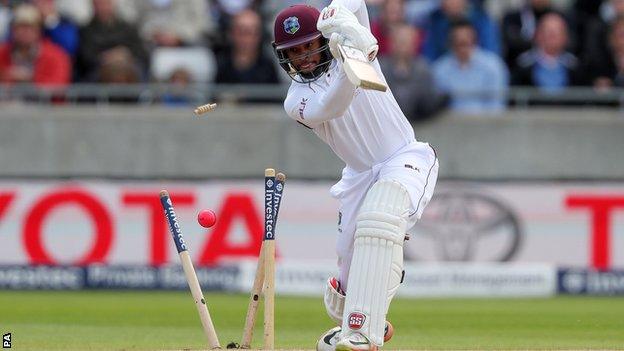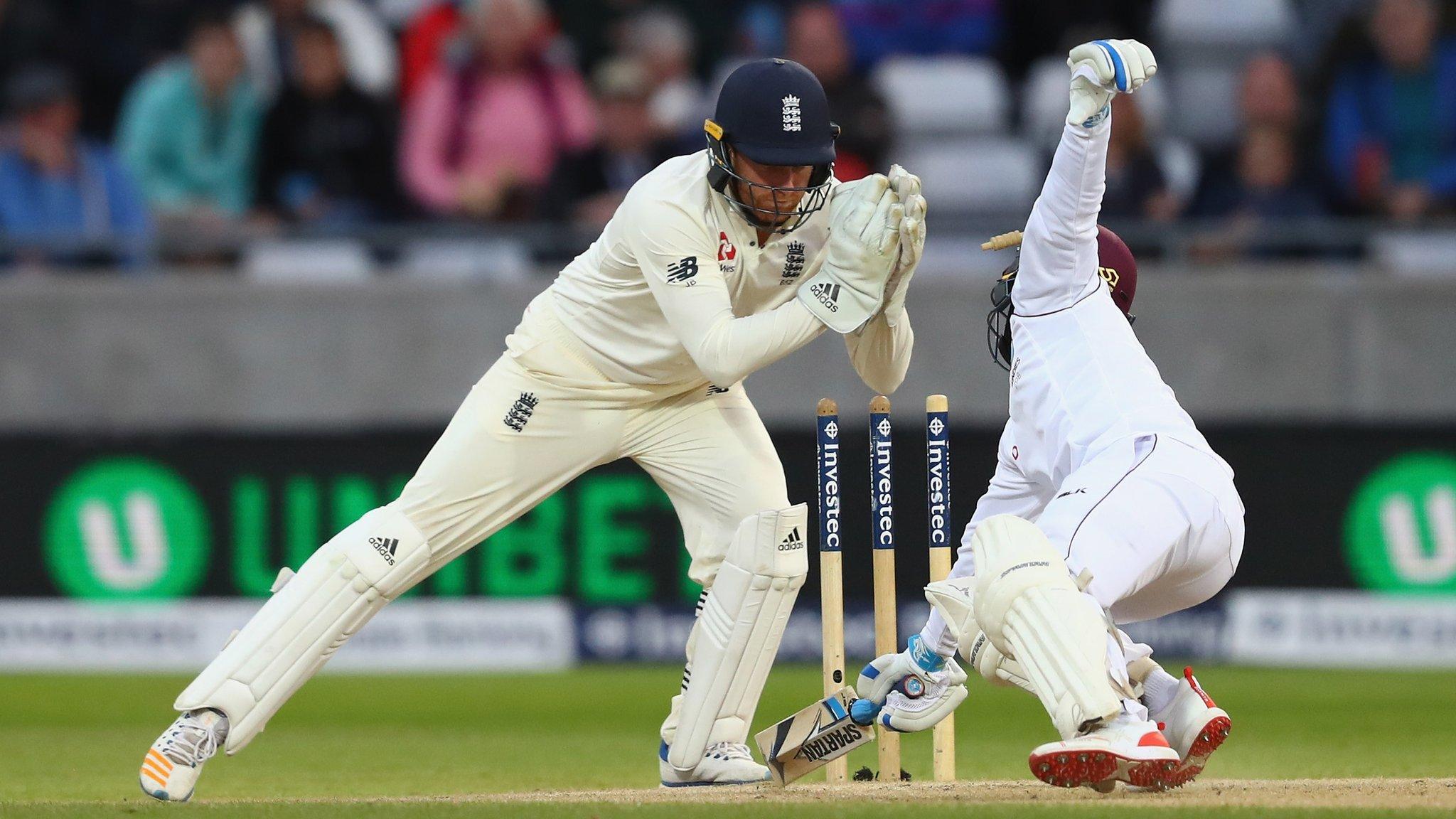England beating poor West Indies is no preparation for Ashes in Australia
- Published
England's innings-and-209-run win against West Indies in the day-night Test at Edgbaston was a disappointing game of cricket.
There was no edge, no bite to the contest.
There was always a danger that England would learn little before the defence of the Ashes in Australia this winter, especially when it comes to those seemingly timeless problems at numbers two, three and five in the batting line-up.
Dawid Malan's 65 aside, that was the case in Birmingham and will probably remain the same when we revert to normal playing hours for the remaining two Tests at Headingley and Lord's.
I'm not saying there are no positives. England, who have already beaten South Africa this summer, should travel to Australia full of confidence.
Joe Root, the new captain, will not be under the microscope. Alastair Cook once again found a massive score at the top of the order and the engine room of Ben Stokes, Jonny Bairstow and Moeen Ali is strong.
The fast bowlers are settled, even if I would like to see Mark Wood fully fit in Australia so England have that extra yard of pace.
But, no matter how many runs Malan, Mark Stoneman and Tom Westley score in the rest of the series, we simply will not know if they are up to the pressure, intensity and hostility of a tour of Australia, because the West Indies bowling is no better than what they would face in county cricket.
With that being the case, I will be very disappointed if those three do not hammer out lots of runs in the rest of the series. I'm not talking about a half-century here or there; I'm talking about a proper hundred.
Only then will we have a better idea of what they are like, but even that will not be enough to stop the pre-Ashes conversation focusing on England's batting.
As well as those currently in the side, names like Haseeb Hameed and Alex Hales will probably be tossed around.
From when the squad is named at the end of the summer to when England play the warm-up games, right up to the beginning of the first Test in Brisbane, we will be wondering if the majority of England's top five can cut it in Australia.
We are waiting to be convinced, and the answers will only come down under.
Poor West Indies what we expected

Shai Hope was one of eight West Indies batsmen who were dismissed twice in a day on Saturday
I take no pleasure in saying that the poor showing of West Indies was pretty much what I expected before the series began.
Even with low expectations, I was still left disappointed by their bowling, which showed no penetration at all.
They have clearly had it drummed into them that, in England, you have to pitch the ball up.
But that does not mean you forego your intent or aggression. We barely saw them bowl a bouncer and young Alzarri Joseph - talked about as having extreme pace - was little more than fast-medium.
Even though the West Indies lost 19 wickets on day three, the bowling was perhaps more of a let-down than the batting, because the batting display was not a surprise.
Their wait for a Test win in this country, which currently stands at 17 years, will almost certainly extend beyond this series.
It is the challenge of Stuart Law, the coach, to identify a group of players with an eye on building something over the next six or seven years.
West Indies Under-19s are the current world champions so there is a reservoir of potential talent in the Caribbean.
It has to be the long-term goal of Law - and everyone connected with West Indian cricket - for that talent to be nurtured to a place where they can once again be competitive in Test cricket.
Day-night cricket not for England

The match at Edgbaston was the fifth day-night Test
I have nothing against the concept of day-night Test cricket and it was reasonable for England to play a home day-nighter in order to prepare for matches in Australia and New Zealand this winter.
But, in the long term, I am not sure further day-night Tests will work in the UK, simply because the unpredictable nature of the weather can make it a poor spectacle for the fans at the ground.
If you have a long, warm, summer evening, that's fine. The problem comes when fans have to wrap up like they are about to head off on an Arctic expedition.
I was leaving Edgbaston just after 7pm and saw plenty of people heading to the car park, frozen solid and not willing to shiver any longer. They were having to miss out on two hours or more of play.
There were other, smaller problems. Occasionally it became hard to see the ball, especially at the beginning of the final session of the day. Having said that, it can sometimes be hard to see the white or red balls.
I am told the players did not have problems picking it up, so that is probably the main thing.
Overall, though, day-time Test cricket in the UK is brilliantly staged and we should celebrate it. Beautiful skies, the white kit of the players against the lovely green grass is something to be proud of.
If organisers can follow the ticket-pricing of Edgbaston - the cheapest for this match came in at £21 - there is no reason why traditional Test cricket cannot continue thrive in England and Wales.
Broad's Botham-beating moment
Stuart Broad hails 'hero' Botham after surpassing wicket tally
This Test will not only be remembered for the floodlights, but also for the moment when Stuart Broad went past Sir Ian Botham's 383 Test wickets to go second on the all-time list of England wicket-takers.
I have known Stuart since he was a very young lad. His dad Chris, someone whom I played against a lot, lived in the next village and brought young Stuart and his sister Gemma to a barbecue at my house.
He is very hard-working and focused on his job of taking wickets for England.
He may have had a few issues going into this game: he perhaps did not get the rewards he would have liked against South Africa and was not too keen on the idea of the pink ball. He was concerned about how the day-nighter would pan out, things like how he would be able to sleep after a late finish.
Perhaps now he will think that day-night matches are not so bad after all.
I hope he still has the outswinger in his locker. At the moment, his stock delivery seems to swing in to the right-hander. Broad did pretty much all of his bowling in the first Test from the Pavilion End, with the breeze pushing the ball in that direction - I suspect that is what he will tell me when he reads this.
He is still a terrific bowler, one capable of those spells that completely destroy an opposing batting line-up - remember Australia in 2009, again in 2013, and South Africa in 2016.
Broad has been a fabulous competitor. When he is on a roll, he blows teams away.
Jonathan Agnew was speaking to BBC Sport's Stephan Shemilt.
- Published19 August 2017

- Published19 August 2017

- Published14 August 2017

- Published18 August 2017

- Published21 September 2017
